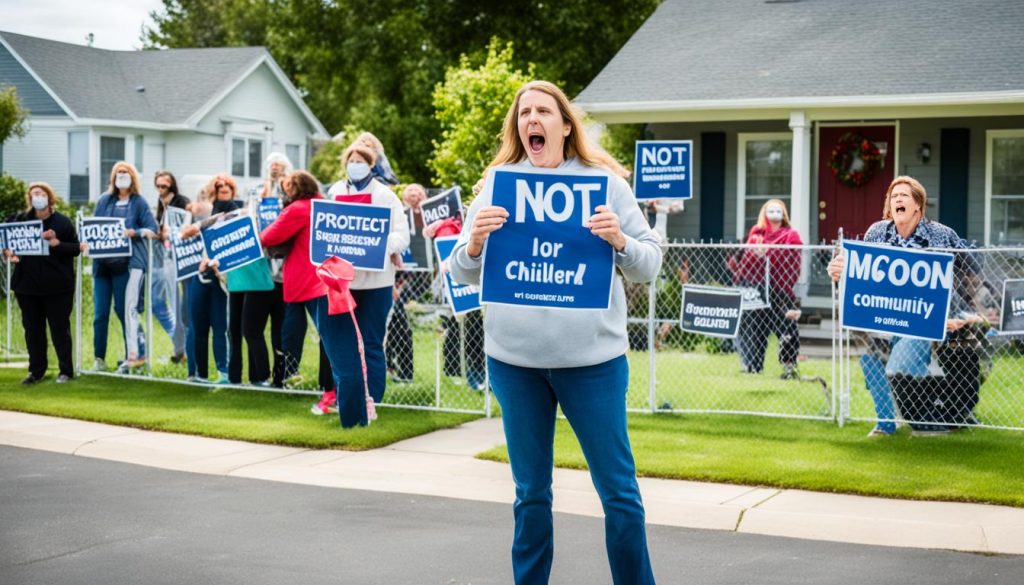Are you considering starting a group home? It’s important to understand the costs involved before embarking on this venture. From the initial investment to ongoing expenses, careful financial planning is crucial for the success of your group home. In this article, we will break down the various costs associated with starting a group home and explore funding options available to you.
Key Takeaways:
- Starting a group home requires careful financial planning and a clear understanding of the costs involved.
- Conduct a market analysis to assess the need for another group home in the local area.
- Determine your goals for serving a specific population, whether it’s seniors, individuals with disabilities, or at-risk children.
- Be prepared to face opposition and build support by obtaining the necessary licenses, permits, and certifications.
- Create a comprehensive business plan that outlines your goals, target population, marketing plan, operational plan, and financial projections.
Analyzing the Local Market
Before starting a group home, it is crucial to conduct a comprehensive analysis of the local market. This analysis will help you understand the demand for group homes in your area and enable you to tailor your services to meet the specific needs of the community.
To begin, perform a needs assessment by reaching out to government agencies and social service organizations. These entities possess valuable insights into the specific requirements and challenges faced by people in your community who may benefit from a group home setting.
In addition to identifying the needs, it is essential to determine the number of existing group homes in your area and analyze their average occupancy levels. This information will provide you with a clear picture of the competitive landscape and help you position your group home in a way that distinguishes it from others.
By differentiating your group home through specialized services or unique amenities, you can attract individuals who may not find their needs fully met by existing homes. This could include specific programs tailored for seniors, individuals with disabilities, or at-risk children, among others. By understanding the specific needs of your community and differentiating your group home based on those needs, you will be better positioned for success.
Gathering Market Insights
When conducting a local market analysis, there are several key factors to consider. These include:
- The population size and demographics of your target area
- The demand for group home services based on the prevalence of vulnerable populations
- The availability of government funding and support for group homes
- The geographical distribution of existing group homes and their occupancy levels
Gathering data on these factors will help you make informed decisions and develop a comprehensive understanding of the local market dynamics for group homes.
By conducting a thorough analysis of the local market, including a needs assessment, occupancy level review, and differentiation strategy, you will be well-equipped to start your group home with a clear understanding of the demand and how to fulfill it effectively.
Assessing Goals and Target Population
When starting a group home, it’s crucial to consider your goals and the population you want to serve. By defining your mission and target demographic, you can effectively tailor your services to meet their specific needs and challenges.
Serving Seniors
If your goal is to serve seniors in a group home setting, you will be providing a nurturing environment that promotes their well-being, independence, and quality of life. Some of the challenges and rewards of serving seniors in a group home include:
- Addressing physical and mental health issues commonly associated with aging
- Providing companionship and social engagement to combat loneliness
- Assisting with activities of daily living and medication management
Serving the Disabled
When serving individuals with disabilities, a group home can offer a supportive and inclusive environment that fosters independence and empowerment. Some of the challenges and rewards of serving the disabled population in a group home include:
- Adapting the physical environment to accommodate different mobility and accessibility needs
- Offering specialized care and support services tailored to individual disabilities
- Advocating for the rights and inclusion of disabled individuals within the community
Serving At-Risk Children
Group homes for at-risk children provide a safe and stable environment for those who have experienced trauma, neglect, or abuse. These homes aim to restore a sense of security and normalcy in their lives. Some of the challenges and rewards of serving at-risk children in a group home include:
- Addressing behavioral issues and providing therapeutic interventions
- Creating a nurturing and structured environment that promotes emotional healing and development
- Collaborating with social workers and education professionals to ensure comprehensive support for the children
By understanding the unique challenges and rewards of serving different group home populations, you can make thoughtful decisions about the target population you want to focus on. Visiting existing group homes and conversing with professionals working in these areas can further enhance your understanding of the specific needs and requirements.
Overcoming Opposition and Building Support
Starting a group home can sometimes face opposition from various angles. It’s important to be prepared for these challenges and have strategies in place to overcome them. Opposition to group homes can arise due to political concerns, neighborhood dynamics, and a lack of understanding about the purpose and benefits of these facilities.
To effectively address opposition, it is crucial to ensure that you comply with all the legal requirements and regulations set forth by the authorities. Obtaining the necessary licenses, permits, and certifications will demonstrate your commitment to operating a legitimate and responsible group home.
Explaining the purpose and need for the group home is key in soothing neighborhood concerns and building support. Emphasize that group homes serve as essential resources for individuals in need, providing a safe and nurturing environment where they can receive the care and support they require. Educate the community about the positive outcomes that group homes can have on individuals’ lives, fostering growth, independence, and a sense of belonging.
Seeking guidance from existing group home operators and government agencies can provide valuable insights and advice. They can share their experiences in overcoming opposition and offer practical strategies for building community support. By actively engaging with these stakeholders, you can tap into a network of knowledge and expertise that will help mitigate opposition and foster a collaborative environment.
Remember, addressing opposition and building support takes time and effort. Open and transparent communication with the community, local leaders, and relevant organizations is crucial for creating a shared understanding and fostering a spirit of cooperation.
To gain a clearer perspective on the various factors related to opposition and support for group homes, refer to the table below:
| Factors | Opposition | Building Support |
|---|---|---|
| Political Concerns | Some political leaders may oppose group homes due to conflicting interests or limited knowledge about their benefits. | Engage in constructive dialogue with political leaders, provide them with information about the positive impact of group homes, and advocate for policy changes that support the establishment of group homes. |
| Neighborhood Dynamics | Local homeowners may have reservations about having a group home in their neighborhood, fearing a negative impact on property values or safety. | Conduct community meetings to address concerns, clarify misconceptions, and highlight the benefits of having a group home in the neighborhood. Provide testimonials from residents of other neighborhoods where group homes have successfully integrated. |
| Legal Requirements | Failure to comply with legal requirements can lead to opposition and potential legal challenges, hindering the establishment of the group home. | Ensure strict compliance with all legal requirements, including obtaining the necessary licenses, permits, and certifications. Establish strong relationships with local authorities to demonstrate your commitment to operating within the law. |
| Explaining the Purpose | Lack of awareness about the purpose and benefits of group homes can fuel opposition and misconceptions. | Engage in community outreach programs to educate the public about the essential services group homes provide and the positive impact they have on individuals’ lives. Share success stories and testimonials from residents, families, and staff members. |

Seek Guidance and Support
If you encounter opposition or face challenges while starting your group home, don’t hesitate to seek guidance and support from experienced operators and government agencies. Their expertise and insights can help you navigate through obstacles and build the necessary support system for the success of your group home.
Creating a Comprehensive Business Plan
When starting a group home, it is crucial to develop a comprehensive business plan that outlines your goals, target population, marketing plan, operational plan, and financial projections. Having a well-constructed business plan will not only attract potential investors but also serve as a guide for your group home’s growth and success.
The contents of a strong group home business plan should include:
- Executive Summary: Provide a concise overview of your group home, highlighting its mission, vision, and key objectives.
- Marketing Plan: Outline your strategies for attracting clients and promoting your group home. Identify your target audience and detail your advertising, branding, and outreach efforts.
- Operational Plan: Describe the day-to-day operations of your group home, including staffing, daily routines, resident care, and safety protocols.
- Management and Organization: Introduce your team, their qualifications, and their roles within the organization. Explain the chain of command and the responsibilities of each position.
- Financial Plan: Present detailed financial projections, including startup costs, monthly expenses, expected revenue, and funding sources. Provide a clear view of profitability and sustainability.
Creating a strong business plan demonstrates your professionalism and commitment to your group home’s success. It also gives potential investors confidence in your ability to manage and grow your business.
For guidance on creating a comprehensive group home business plan and accessing support for small businesses, consult resources like the U.S. Small Business Administration. These organizations offer valuable insights, templates, and resources to help you develop a robust business plan.
By investing time and effort into creating a thorough business plan, you will position your group home for success and attract the necessary support to make your vision a reality.
Conclusion
Starting a group home requires careful planning and a significant financial investment. By analyzing the local market, setting clear goals, overcoming opposition, creating a comprehensive business plan, and assessing your finances, you can estimate the costs involved in starting a group home.
The initial investment for starting a group home typically includes expenses such as facility rental or purchase, licensing and permits, staffing, equipment and supplies, marketing and advertising, and day-to-day operational costs. These costs can vary depending on the size of the facility, the specific needs of the target population, and the location of the group home.
It is important to consider exploring funding options such as grants, loans, or creative fundraising methods to support your group home. Research potential sources of funding, including government grants or private organizations that provide financial assistance for social service initiatives.
With thorough planning and the support of the community and stakeholders, you can establish a successful group home that fills a critical need in your community. Remember to adhere to all legal requirements, maintain high-quality standards of care, and continuously monitor and adjust your business operations for long-term success.
FAQ
How much does it cost to start a group home?
The cost to start a group home can vary depending on several factors. It typically includes expenses such as facility rental or purchase, licensing and permits, staffing, equipment and supplies, marketing and advertising, and day-to-day operational costs. The total investment required can range from tens of thousands to hundreds of thousands of dollars.
What are the startup costs for a group home?
The startup costs for a group home may include facility expenses (rental or purchase), licensing and permits, staffing (salaries and benefits), equipment and supplies (furniture, medical equipment, etc.), marketing and advertising, and ongoing operational costs.
How can I finance the startup costs for a group home?
There are several financing options available to cover the startup costs for a group home. These may include obtaining grants from government agencies or charitable organizations, applying for low-interest loans, seeking investments from private individuals or organizations, or exploring creative fundraising methods such as crowdfunding or community partnerships.
What factors should I consider when analyzing the local market for a group home?
When analyzing the local market for a group home, consider factors such as the demand for group homes in the area, the number of existing homes and their average occupancy levels, the specific needs of the community, and the potential for differentiation by offering unique services or serving a specific population.
How can I overcome opposition when starting a group home?
Overcoming opposition when starting a group home can be challenging, but there are several steps you can take. Ensure that you have all the necessary licenses, permits, and certifications to operate legally. Explain the purpose and need for the group home to soothe neighborhood concerns and build support. Seek guidance from existing group home operators and government agencies who can provide valuable insights and support.
What should be included in a comprehensive business plan for a group home?
A comprehensive business plan for a group home should include sections such as an executive summary, market analysis, marketing plan, operational plan, management and organization, financial projections, and funding strategies. It should provide a clear roadmap for your group home’s growth and demonstrate your understanding of the industry, target population, and market dynamics.
Where can I find resources and support for creating a business plan and starting a group home?
Resources and support for creating a business plan and starting a group home can be found through entities such as the U.S. Small Business Administration (SBA). The SBA offers guidance on creating a business plan, accessing funding options, and provides resources for small business owners. Additionally, local government agencies and social service organizations may offer assistance and information specific to your community.
Can you provide an overview of the anticipated costs for starting a group home?
The anticipated costs for starting a group home can vary widely depending on various factors, such as the location, size, and target population of the home. However, common expenses may include facility rental or purchase (which can range from several thousand to several hundred thousand dollars), licensing and permits, staffing salaries and benefits, equipment and supplies, marketing and advertising, and ongoing operational costs.







